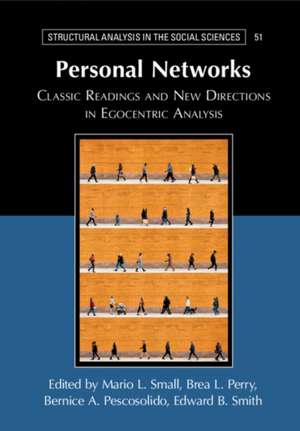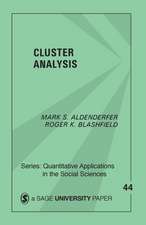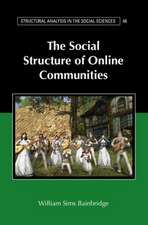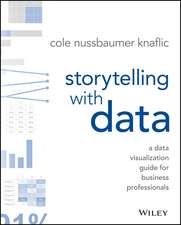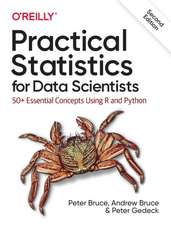Personal Networks: Classic Readings and New Directions in Egocentric Analysis: Structural Analysis in the Social Sciences
Editat de Mario L. Small, Brea L. Perry Autor Bernice Pescosolido, Edward B. Smithen Limba Engleză Paperback – 15 sep 2021
| Toate formatele și edițiile | Preț | Express |
|---|---|---|
| Paperback (1) | 411.43 lei 3-5 săpt. | +57.55 lei 6-12 zile |
| Cambridge University Press – 15 sep 2021 | 411.43 lei 3-5 săpt. | +57.55 lei 6-12 zile |
| Hardback (1) | 1085.63 lei 3-5 săpt. | |
| Cambridge University Press – 15 sep 2021 | 1085.63 lei 3-5 săpt. |
Din seria Structural Analysis in the Social Sciences
-
 Preț: 238.07 lei
Preț: 238.07 lei -
 Preț: 394.00 lei
Preț: 394.00 lei -
 Preț: 232.67 lei
Preț: 232.67 lei -
 Preț: 195.77 lei
Preț: 195.77 lei -
 Preț: 226.46 lei
Preț: 226.46 lei -
 Preț: 289.29 lei
Preț: 289.29 lei -
 Preț: 287.48 lei
Preț: 287.48 lei -
 Preț: 351.15 lei
Preț: 351.15 lei -
 Preț: 338.80 lei
Preț: 338.80 lei - 11%
 Preț: 546.03 lei
Preț: 546.03 lei -
 Preț: 434.92 lei
Preț: 434.92 lei -
 Preț: 286.30 lei
Preț: 286.30 lei -
 Preț: 378.11 lei
Preț: 378.11 lei -
 Preț: 323.65 lei
Preț: 323.65 lei -
 Preț: 334.16 lei
Preț: 334.16 lei -
 Preț: 284.56 lei
Preț: 284.56 lei -
 Preț: 236.40 lei
Preț: 236.40 lei -
 Preț: 349.80 lei
Preț: 349.80 lei -
 Preț: 300.79 lei
Preț: 300.79 lei -
 Preț: 421.39 lei
Preț: 421.39 lei -
 Preț: 284.56 lei
Preț: 284.56 lei -
 Preț: 368.31 lei
Preț: 368.31 lei - 11%
 Preț: 520.83 lei
Preț: 520.83 lei -
 Preț: 277.97 lei
Preț: 277.97 lei -
 Preț: 381.45 lei
Preț: 381.45 lei - 11%
 Preț: 646.96 lei
Preț: 646.96 lei -
 Preț: 250.30 lei
Preț: 250.30 lei -
 Preț: 208.61 lei
Preț: 208.61 lei - 11%
 Preț: 645.26 lei
Preț: 645.26 lei
Preț: 411.43 lei
Nou
Puncte Express: 617
Preț estimativ în valută:
78.73€ • 82.30$ • 66.53£
78.73€ • 82.30$ • 66.53£
Carte disponibilă
Livrare economică 14-28 februarie
Livrare express 30 ianuarie-05 februarie pentru 67.54 lei
Preluare comenzi: 021 569.72.76
Specificații
ISBN-13: 9781108813914
ISBN-10: 1108813917
Pagini: 770
Dimensiuni: 176 x 252 x 40 mm
Greutate: 1.36 kg
Ediția:Nouă
Editura: Cambridge University Press
Colecția Cambridge University Press
Seria Structural Analysis in the Social Sciences
Locul publicării:New York, United States
ISBN-10: 1108813917
Pagini: 770
Dimensiuni: 176 x 252 x 40 mm
Greutate: 1.36 kg
Ediția:Nouă
Editura: Cambridge University Press
Colecția Cambridge University Press
Seria Structural Analysis in the Social Sciences
Locul publicării:New York, United States
Cuprins
Part I. Background; Introduction; Part II. Early Foundations; 1. From Simmel, 'On the Significance of Numbers for Social Life: Introduction,' 'The Isolated Individual and the Dyad,' 'The Triad,' and The Web of Group Affiliations: Commentary, 'Georg Simmel's Contribution to Social Network Research'; 2. From Katz and Lazarsfeld, Personal Influence: Commentary, 'Influencers, Backfire Effects and the Power of the Periphery'; 3. From Mitchell, 'The Concept and Use of Social Networks': Commentary, 'On J. Clyde Mitchell's 'The Concept and Use of Social Networks''; 4. From Bott, 'Urban Families: Conjugal Roles and Social Networks': Commentary, 'Commentary on Bott's 'Family and Social Network''; 5. From Festinger, Schachter, and Back, Social Pressures in Informal Groups: Commentary, 'Festinger, Schachter, and Back's Social Pressures in Informal Groups'; 6. From Bernard et al., 'The Problem of Informant Accuracy': Commentary, 'Implications of Informant Accuracy Research for Ego Networks'; 7. From White, Identity and Control: Commentary, 'On Parachutes and Lion-Taming'; Part III. Later Foundations; 8. From Fischer, To Dwell among Friends: Commentary, 'From the Northern California Community Study, 1977–78, to UCNets, 2015–20'; 9. From Granovetter, 'The Strength of Weak Ties': Commentary, 'Strength of Weak Ties in the Labor Market: An Assessment of the State of Research'; 10. From Wellman and Wortley, 'Different Strokes from Different Folks': Commentary, 'A Network Pilgrim's Progress: Twenty-Six Realizations in Fifty-Five Years'; 11. From Coleman, 'Social Capital in the Creation of Human Capital': Commentary, 'Three Decades of Research into Social Capital: Achievements, Blind Spots, and Future Directions'; 12. From Pescosolido, 'Beyond Rational Choice': Commentary, 'Confronting How People Cope with Crisis: From the Social Organization Strategy Framework to the Network Episode Model to the Network Embedded Symbiome'; 13. From Feld, 'The Focused Organization of Social Ties': Commentary, 'Reflections On 'The Focused Organization of Social Ties' and Its Implications for Bonding and Bridging' 14. From Burt, Structural Holes: Commentary, 'Structural Holes Capstone, Cautions, and Enthusiasms'; 15. From Laumann, Marsden, and Prensky, 'The Boundary Specification Problem in Network Analysis': Commentary, 'On the Boundary Specification Problem in Network Analysis: An Update and Extension to Personal Social Networks'; 16. From McPherson, Smith-Lovin, and Cook, 'Birds of a Feather': Commentary, 'The Enormous Flock of Homophily Researchers: Assessing and Promoting a Research Agenda'; 17. From Huckfeldt and Sprague, 'Networks in Context': Commentary, 'Individuals, Groups, and Networks: Implications for the Study and Practice of Democratic Politics'; 18. From Nan Lin, 'Building a Network Theory of Social Capital' Commentary, 'Social Capital: An Update'; 19. On the General Social Survey: 'Egocentric Network Studies within the General Social Survey: Measurement Methods, Substantive Findings, and Methodological Research'; Part IV. New Perspectives; 20. On Cognition: 'Network Representation Capacity: How Social Relationships are Represented in Human Mind'; 21. On Mobilization: 'How Actors Mobilize their Networks in Practice'; 22. On Trust: 'Self-Verification, Trust, and Social Capital Mobilization'; 23. On Dynamics: 'Personal Network Dynamics: Organizing Principles of Stability and Change from Complex Systems Theory'; 24. On Inequality: 'The Context of Network Inequality'; 25. On Culture: 'The Problem of Culture Flows in Weak Ties'; 26. On Migration: 'Personal Networks and Migration Trajectories'; 27. On Movements: 'The Opportunities and Challenges of Studying Social Movement Ego-Networks: Online and Offline'; 28. On Social Media: 'Studying Social Media from an Ego-Centric Perspective'.
Recenzii
'Much of the world thinks in terms of village-like groups and individuals, when in reality they're operating in social networks. That's why the Covid-19 virus spreads so quickly. Few people live in tight bubbles – they maneuver among overlapping partial networks of friends, family, neighbors, schools, and work. This myth-busting book is a masterpiece – brilliantly showing the impact of personal networks in our lives. Its unique format shows the path-breaking development of the network perspective – by linking classic readings and current research into community, cognition, culture, social capital, social movements, work, inequality, and social media.' Barry Wellman, FRSC
'Personal Networks is an exemplary collection and a signal contribution to the field of social network analysis. The introduction provides both an overview for the novice and a synthesis that will interest even veteran network scholars. The classic works are impeccably chosen, with astute excerpting for undergraduate syllabi and substantial and definitive commentaries by leading contemporary authors. More recent classics are equally well chosen – I assign almost all of them in my graduate or undergraduate classes – and the extensive and engaging commentaries, in most cases by the original authors, represent valuable overviews in their own right. The papers in the final section likewise add value by reviewing research and developing theory on central fields of sociology to which the study of personal networks contributes. Personal Networks not only aggregates the main ideas in its area, it integrates them, defining a field and a research agenda. It will be an indispensable resource for anyone teaching a graduate or undergraduate course in social network analysis, a one-stop shopping experience for graduate students taking exams in this field, and a source of insight for any scholar working in this area.' Paul DiMaggio, NYU
'Personal Networks is an exemplary collection and a signal contribution to the field of social network analysis. The introduction provides both an overview for the novice and a synthesis that will interest even veteran network scholars. The classic works are impeccably chosen, with astute excerpting for undergraduate syllabi and substantial and definitive commentaries by leading contemporary authors. More recent classics are equally well chosen – I assign almost all of them in my graduate or undergraduate classes – and the extensive and engaging commentaries, in most cases by the original authors, represent valuable overviews in their own right. The papers in the final section likewise add value by reviewing research and developing theory on central fields of sociology to which the study of personal networks contributes. Personal Networks not only aggregates the main ideas in its area, it integrates them, defining a field and a research agenda. It will be an indispensable resource for anyone teaching a graduate or undergraduate course in social network analysis, a one-stop shopping experience for graduate students taking exams in this field, and a source of insight for any scholar working in this area.' Paul DiMaggio, NYU
Notă biografică
Bernice A. Pescosolido is Distinguished Professor in the Department of Sociology at Indiana University.
Descriere
Combines classic and cutting-edge scholarship on personal social networks. A must-have resource for both newcomers and seasoned experts.
